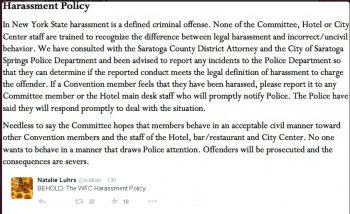The Viable Paradise writing workshop meets on Martha’s Vineyard every October. I’ve been giving a lecture on using ecosystem services as a world-building framework for some years, and every year, I add more and more on the ecology and history of the island we’re on.
A History of Martha’s Vineyard for Viable Paradise, in Ten Minutes or Less
23,000 years ago, the Laurentian glacier reached its farthest extent right here, and dropped a big pile of rocks and assorted stuff. It was about 1,500 feet thick, so there was a LOT of stuff. That forms the northwest edge of this triangular island. Everything else is sand and gravel washed down from that northwestern ridge as the glacier melted (1500 feet of ice is a fuckton of water!). Technically, this is a terminal moraine and an outwash plain, or nontechnically a big mess sand pile.
That glacier retreated, but there was still enough ice that sea level was 300 feet lower than now. This was part of the mainland, and it was tundra. Moose, woves, even musk oxen.
More on geology and glaciers Even more on geology
Ecology
It’s still a giant sandpile surrounded by ocean, and that shapes its ecology. It’s no longer a tundra, but has salt marshes, beaches, and many kinds of ecosystems that can tolerate very sandy soils.
Climate change: temperatures increasing faster here than most of the US, hurricanes are intensifying, and sea levels are rising.
First people
Ten to twelve thousand years, people walked over, and settled the hills. The Wampanoag have been living here since before Martha’s Vineyard was an island. About 7,500 years ago, the Vineyard Sound suddenly flooded, and that event appears in the oral histories. Water continued to rise over the next few thousand years, and the island is now about 20 miles long and 10 miles wide.
The Wampanoag again hold their ancestral lands on the Aquinnah peninsula.
Europeans arrived in 1602, and promptly renamed Noepe as Martha’s Vineyard. The colonists established producive farms and fisheries.
The Deaf community
In the late 1600s a deaf man and his family moved to the Vineyard. Because of the small population, by the 1850s, one in 155 people on the Island and 1 in 25 in Chilmark were deaf. Martha’s Vineyard developed its own sign language, and everyone spoke it, deaf and hearing. Deaf folks were integral members of all parts of the community, including the deaf man who founded the first bank here.
- More on Deaf culture here This article adds some more modern insights into the development of the Deaf community.
Black history
Early records showed enslaved people brought here. Massachusetts abolished slavery in 1783. Black people continued to work laborers and in the whaling industry. Unlike most other jobs, the latter offered anyone means for advancement: at least 60 captains were black, some based on the Vineyard. William Martin, the great-grandson of an enslaved man, captained 14 voyages over fifty years.
Around the beginning of the 20th century, the Methodist religious revival led to many people moving here, including Black religious leaders and entrepreneurs. Some of these families became wealthy, and the Island developed into a welcoming place for Black families to vacation, both rich ones and poorer ones. The Obamas vacation here.
Telling stories about place and people
Not everywhere is as complex as Martha’s Vineyard, either ecologically or culturally, but everywhere has its own set of stories about people and place, and how they interact. The resources here made various kinds of lives possible for many different kinds of of people.
